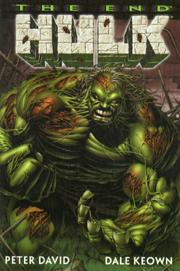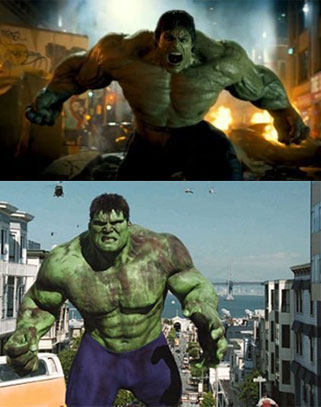MTV’s Kurt Loder refers to the Ang Lee’s film as “too thoughtful,” which is a bad thing for reasons I and Roger Ebert can’t understand. There are two kinds of Hulk fans. There are those who enjoy the dramatic conflict between an alienated egghead scientist and his raging psychopathic alter ego, and then there are those who just like to see a big green monster smash things.
 Hulk The End |
I’m of the former club of fanboys (a miniscule club, I know). My favorite Hulk comics are those with Hard SF themes and speculative storytelling. One of my favorite Hulk comics was a What if..? issue involving the Hulk stranded on a distant planet, leaving Dr. Bruce Banner as his only remaining nemesis. They take turns writing taunts in the dirt to frustrate one another while sabotaging each other’s efforts to live comfortably. Another favorite, titled The End, follows the Hulk as the last human on Earth after a nuclear war, with Dr. Banner begging the monster to let them die.
Leterrier’s 2008 Hulk movie is for the fanboys who need another “explosion of violence” fix. I think there was a plot in there somewhere. It probably had something to do with Dr. Bruce Banner not being happy about turning into the Hulk, and trying to find a cure, but the explosions are what’s important.
There is no CGI powerful enough to make the big green hairless giant look even remotely real, and Leterrier seem oblivious to this fact, opting to place the Hulk in a gritty, real-world setting. Ang Lee recognized the toy-like appearance of his Hulk and crafted a movie style to match its main character. Ang Lee’s Hulk is filled with pastels, scenes cut into comic book panels, and comic book storytelling.
 Leterrier’s Hulk (top) Ang Lee’s Hulk (bottom) |
Ang Lee’s Hulk doesn’t kill anyone. In fact, Ang Lee’s Hulk goes to great pains not to kill anyone. Even when they are blasting bullets, explosive shells, and missiles at him, Lee’s Hulk retains just enough of the human being inside to restrain himself from annihilating his persecutors, as easy as that would be for him.
Lots and lots of people die because of Louis Leterrier’s Hulk, which raises a serious ethical issue for Edward Norton’s version of Bruce Banner. Doesn’t he have a moral obligation to euthanize himself? Instead of selfishly trying to find a cure, a bullet to the head would solve everyone’s problems (Although this would not work in the comic).
Leterrier’s ending is the more epic on an action-packed special-effects scale, while Ang Lee’s ending is more epic on a mythological scale. The battle between Lee’s Hulk and the elemental force his father has become rages across the sky, earth, and into the dark depths. The battle between Leterrier’s Hulk and Abomination is just a street fight.
Leterrier’s Hulk wins a few brownie points for putting the Environmental Media Association’s Green Seal in its credits, but the fans of his Hulk won’t care. Only Ang Lee’s fans would appreciate such a “thoughtful” gesture.
Comments
8 responses to “Hulk VS Hulk”